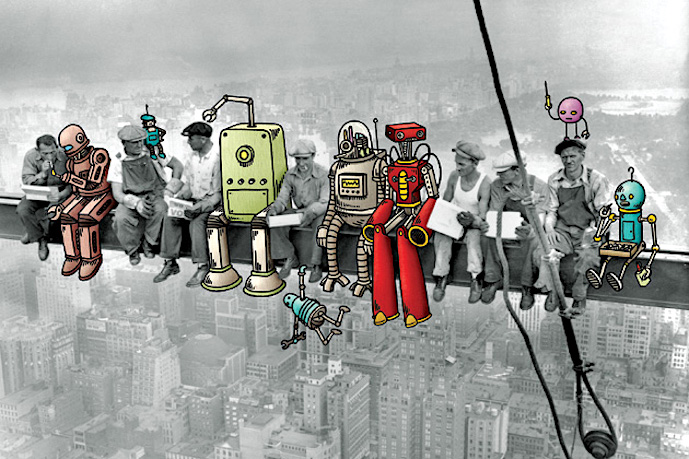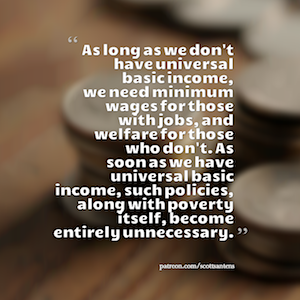 Twenty Twenty-Four – our Orwellian destiny?
Twenty Twenty-Four – our Orwellian destiny? drew parallels between the disturbing prophesies in George Orwell’s
Nineteen Eighty-Four and the disquieting situation we are now experiencing as sophisticated technologies – robots and algorithms – are enabling the collection of more and more personal data that is being used increasingly by companies and political parties to manipulate our thinking, our behaviour and our decision-making. This is alarming because it threatens the very fabric of our society. You can read the details in
Twenty Twenty-Four – our Orwellian destiny?
There is though an even more distressing accompaniment to these technological advances – the displacement of human workers by robots and algorithms. This piece addresses this issue. It is rather long because the ramifications are so complex. Please be patient.
We have already seen in our own country robots enter manufacturing to do work that previously was done by people. Thousands have been displaced, and made redundant. The number displaced by algorithms though will be greater still. Just look at some relevant facts from
Twenty Twenty-Four – our Orwellian destiny?:
In the coming 10 to 20 years around half of today's jobs will be threatened by algorithms.
Even today, algorithms perform 70% of all financial transactions.
People, who thereby earned a living to support themselves and their families, previously carried out those transactions. It won’t be long before virtually all such transactions will be algorithm-driven. The only ones left employed will be those who write the algorithms, and don’t be surprised if automatically generated algorithms appear that require even fewer humans.
As a result of automation and algorithm driven processes 40% of today's top 500 companies will have vanished in a decade.
Reflect on that – during the next ten years, by 2027, 200 of the top 500 companies will disappear.
The top 10 global companies listed in the
Fortune Top 500, and their current revenues in millions of US dollars, are:
- Walmart $482,130 (i.e. $482.13 billion)
- State Grid Corporation of China $329,601
-
China National Petroleum
$299,271
-
Sinopec Group
(China Petroleum & Chemical Corporation) $294,344
- Royal Dutch Shell
$272,156
-
Exxon Mobil
$246,204
-
Volkswagen
$236,600
- Toyota Motor
$236,592
-
Apple
$233,715
-
BP
$225,982
Note that three are in China, one is the world’s largest electric utility company in the world (State Grid Corporation of China), five are oil companies, two are automobile manufacturers, one is a giant retail outlet, and one an IT company.
Imagine how many workers they employ to do both manual and cognitive work.
Nobody knows whether any of these will be among the 200 of the top 500 companies that will disappear in the next decade; the list is provided simply to illustrate the size and financial strength of companies in the Top 500, so that an idea of their current workforce can be contemplated.
When such companies disappear, what, if anything, will replace them? What will workers in those companies do after their employers have gone? Will there be alternative work? If not, how will they live? Are governments planning for this eventuality? Are there
any who are doing so? Is
our federal government doing so?
Futurists assure us that as old jobs disappear new jobs will be created; many will be jobs that have never been heard of. Even as that is the case, it seems inevitable that there will be a net loss of jobs. It seems inescapable that many, many millions of workers around the world will lose their jobs;
Richard di Natale asserts that 5 million Australian jobs will be lost in the next decade. Unless alternative jobs can be created, there will be vast numbers of unemployed. Many may never be able to work again, earn again, support a family again, or prepare for retirement. As job opportunities dry up permanently, some will never have a job. The desolation will be stupefying, and deeply distressing.

None of us can escape this unfolding tragedy. Even those with a job will rub shoulders with those without a job – in the streets, in the supermarkets, in shopping centres, at sporting venues, at meetings, and at church. Society risks being fractured. Tensions will rise as those who work are called upon to support those who don’t and can’t. Governments will have more calls on their social welfare support than ever.
Given the magnitude of the emerging problem of an expanding body of unemployed, what can be done? The unemployed can’t be abandoned to wallow in poverty and sink into homelessness. Yet that is what is already happening. Did you see
Four Corners on Monday 13 March:
The Price of the American Dream produced by French film-maker Helene Eckmann?
The episode was promoted with these words:
"I never figured I'd be in this kind of situation, for my kids to be in this kind of situation...I'm dumbfounded."
"Make America Great Again!" was the catch cry that propelled President Donald Trump all the way to The White House. He tapped into the deep sense of unease felt by many Americans, that despite the nation's economic recovery after the global financial crisis, they have been left behind.
"It's a struggle every day. How am I gonna make it today? How am I gonna make money to buy food, how am I gonna make money to cook my kids dinner at night?"
Four Corners portrayed the distressing story of those Americans desperately hoping for change – America's shrinking middle class – who are fast joining the swelling ranks of the working poor. You will be surprised and disturbed by what you see.
Yet this is just what we can anticipate in our own country.
What can and should be done?
The response of the LNP has been dismal. Where is the evidence that it even recognizes this emerging problem let alone is doing something about it?
Not satisfied with making matters worse for the poorest sections of our community via the punitive 2104 Abbott/Hockey Budget, the then employment minister Eric Abetz came up with the brilliant requirement that the unemployed be required to apply for
40 jobs a month, a hopelessly unrealistic impost (especially in Abetz’ home state of Tasmania), designed to further humiliate those without a job. Then along came the requirement that job seekers applying for Newstart or Youth Allowance, who have not been previously employed, should face a
six-month waiting period of no income support before they are eligible for payments.
More recently we had the
Centrelink's disastrous data matching program that targetted pensioners and the disabled demanding repayment of alleged overpayments. For a royal flush, add to these assaults the threatened Medicare co-payment system, and the LNP-approved reduction of penalty rates at weekends.
Why does the LNP do such things?
Because their political philosophy is grounded in the ‘Strict Father’ model of parenting that conservatives embrace, a concept explained in
The myth of political sameness published on
The Political Sword in December 2013. George Lakoff, who has studied American politics for decades, uses this metaphor:
The Nation is a Family.
The Government is a Parent.
The Citizens are the Children.
Building on the Nation as Family metaphor, Lakoff identifies two types of family based upon two distinct styles of parenting, which he assigns to conservatives and progressives respectively. When applied to the Nation as Family metaphor, they result in vastly different behaviours.
The two parenting styles are:
The Strict Father model, and
The Nurturant Parent model.
He’s what he has to say about the ‘Strict Parent’:
”In the conservative moral worldview, model citizens are those who best fit all the conservative categories for moral action. They are those who have conservative values and act to support them; who are self-disciplined and self-reliant; who uphold the morality of reward and punishment; who work to protect moral citizens; and who act in support of the moral order.
"Those who best fit all these categories are successful, wealthy, law-abiding conservative businessmen who support a strong military and a strict criminal justice system, who are against government regulation, and who are against affirmative action. They are the model citizens. They are the people whom all Americans should emulate and from whom we have nothing to fear. They deserve to be rewarded and respected.
“The American Dream is that any honest, self-disciplined, hard-working person can do the same. These model citizens are seen by conservatives as the Ideal Americans in the American Dream.”
By contrast, the unemployed, those who don’t or can’t work, are anathema to conservatives. They do not fulfill these criteria.
Lakoff summarises:
The conservative/liberal [progressive] division is ultimately a division between strictness and nurturance as ideals at all levels – from the family to morality to religion and, ultimately, to politics. It is a division at the center of our democracy and our public lives, and yet there is no overt discussion of it in public discourse. Yet it is vitally important that we do so if Americans are to understand, and come to grips with, the deepest fundamental division in our country, one that transcends and lies behind all the individual issues: the role of government, social programs, taxation, education, the environment, energy, gun control, abortion, the death penalty, and so on. These are ultimately not different issues, but manifestations of a single issue: strictness versus nurturance.
In Australia, an identical and just as fundamental division exists between the Coalition, the conservatives, and Labor and the Greens, the progressives. This division results in the striking differences in attitude, behaviour, rhetoric, policy, and indeed morality, which day after day define our own conservatives and our own progressives. It explains so much of the contrast we see.
How then will the unfolding tragedy of increasing and intractable unemployment be managed? What will the LNP do in the face of its overbearing conservative elements? What will progressives, such as Labor and the Greens, do? Will they simply follow the Strict Father and Nurturant Parent models respectively that so govern their behaviour?
Already we have seen the LNP punitively apply the Strict Father model to the unemployed and the never employed. They see them as ‘leaners’ and ‘dole bludgers’ who are uninterested in finding work, lazy about applying for jobs, fussy about what work they will do, quick to quit if they don’t like a job, preferring instead to sleep in, watch TV and drink VBs. They aggressively tell them, indeed all of us, that ‘the age of entitlement is over’. Except, of course, for them!
The LNP exhibits anger towards those without a job, believes that those who don’t have one are lesser beings that ought to be hounded, demeaned, humiliated, and left minimally supported. How on earth can the LNP, while harbouring such attitudes, manage the tsunami of job losses that we know is coming as automation and algorithms sweep across our nation and the globe? They have not uttered one word about this peril. Do they have any idea what to do? Will their Strict Father approach permanently disable them politically? Will they ever be able to offer a solution? I doubt it.
Yet there are solutions, there are ways of managing the inevitable changes to our society.
What then is possible?
Two concepts are gaining momentum:
A universal minimum basic wage for all working age citizens, whether or not they have a job.
A shorter working week, so that more people can be employed to do the work that is available.
Richard di Natale promoted the latter in his
National Press Club address on 13 March. It’s an idea, but it is embryonic. I won’t expand on it here. Instead, I’ll focus on the concept of a universal basic wage as a counter to the rising unemployment resulting from automation.
In the July/August 2014 issue of
Politico Magazine there was a seminal article by Nick Hanauer, billionaire investor in Amazon titled:
The Pitchforks Are Coming – For Us Plutocrats
His long article that extends over several web pages, is well worth reading in full, but here are some excerpts:
He advocates a minimum basic wage for everyone. .
To highlight the need for it, he begins by contrasting extremely rich oligarchs like himself with the rest of US society to demonstrate the rapidly rising inequality there, something that will progressively worsen as job losses and unemployment due to automation bite:
"The divide between the haves and have-nots is getting worse really, really fast. In 1980, the top 1 percent controlled about 8 percent of U.S. national income. The bottom 50 percent shared about 18 percent. Today, the top 1 percent share about 20 percent; the bottom 50 percent, just 12 percent.
"But the problem isn’t that we have inequality. Some inequality is intrinsic to any high-functioning capitalist economy. The problem is that inequality is at historically high levels and getting worse every day. Our country is rapidly becoming less a capitalist society and more a feudal society. Unless our policies change dramatically, the middle class will disappear, and we will be back to late 18th-century France. Before the revolution!
"And so I have a message for my fellow filthy rich, for all of us who live in our gated bubble worlds: "Wake up, people. It won’t last."
"If we don’t do something to fix the glaring inequities in this economy, the pitchforks are going to come for us. No society can sustain this kind of rising inequality. In fact, there is no example in human history where wealth accumulated like this and the pitchforks didn’t eventually come out. You show me a highly unequal society, and I will show you a police state. Or an uprising. There are no counterexamples. None. It’s not if, it’s when."
Here is his argument for a minimum basic wage:
"The model for us rich guys here should be Henry Ford, who realized that all his autoworkers in Michigan weren’t only cheap labor to be exploited; they were consumers, too. Ford figured that if he raised their wages, to a then-exorbitant $5 a day, they’d be able to afford his Model Ts.
"What a great idea. My suggestion to you is: Let’s do it all over again. We’ve got to try something. These idiotic trickle-down policies are destroying my customer base. And yours too.
"It’s when I realized this that I decided I had to leave my insulated world of the super-rich and get involved in politics. Not directly, by running for office or becoming one of the big-money billionaires who back candidates in an election. Instead, I wanted to try to change the conversation with ideas—by advancing what my co-author, Eric Liu, and I call “middle-out” economics. It’s the long-overdue rebuttal to the trickle-down economics worldview that has become economic orthodoxy across party lines – and has so screwed the American middle class and our economy generally. Middle-out economics rejects the old misconception that an economy is a perfectly efficient, mechanistic system and embraces the much more accurate idea of an economy as a complex ecosystem made up of real people who are dependent on one another.
"Which is why the fundamental law of capitalism must be: If workers have more money, businesses have more customers. Which makes middle-class consumers, not rich businesspeople like us, the true job creators. Which means a thriving middle class is the source of American prosperity, not a consequence of it. The middle class creates us rich people, not the other way around."
Subsequently, he was interviewed about his ideas on
Lateline by Steve Cannane, which you may find interesting viewing.
Many are thinking along this line.
Another article you may enjoy reading is in
The Guardian of 6 March 2017 titled:
Utopian thinking: the easy way to eradicate poverty by Rutger Bregman, subtitled:
Keeping people poor is a political choice we can no longer afford, with so much human potential wasted. We need a universal basic income..
He concludes:
"It’s an incredibly simple idea: universal basic income – a monthly allowance of enough to pay for your basic needs: food, shelter, education. And it’s completely unconditional: not a favour, but a right. But could it really be that simple? In the last three years, I have read all I could find about basic income. I researched dozens of experiments that have been conducted across the globe. And it didn’t take long before I stumbled upon the story of a town that had done it, had eradicated poverty – after which nearly everyone forgot about it."
He goes on to describe what happened in the Canadian town of Dauphine, northwest of Winnipeg, beginning in 1974.
It makes exciting reading. Richard di Natale mentioned the concept in an answer to a question at his
National Press Club address, the only federal politician I have heard to do so. He mentioned that it is being trialled in several countries, notably Scandinavian nations.
So there is an answer to the question: How will those displaced by technology survive?
One is the idea of a universal minimum basic wage for all whose income is insufficient to meet basic needs for food, shelter, education and healthcare.

Another is the idea of job sharing so that some who are overworked relinquish work to those who, displaced by technology, have none, or too little – Richard di Natale’s ‘shorter working week’.
There are solutions to the growth of technology-induced unemployment, ones that have already been shown to be effective, and others that are worth a trial.
But who is even thinking about the problem, let alone doing anything?
The Greens have begun, but what of our government and our opposition? So far, oppressive silence and indolence is all we have seen from the major players. With their Strict Father mindset, we can expect nothing from the LNP, but where is Labor with its Nurturant Parent mindset?
Current rating: 0 / 5 | Rated 0 times